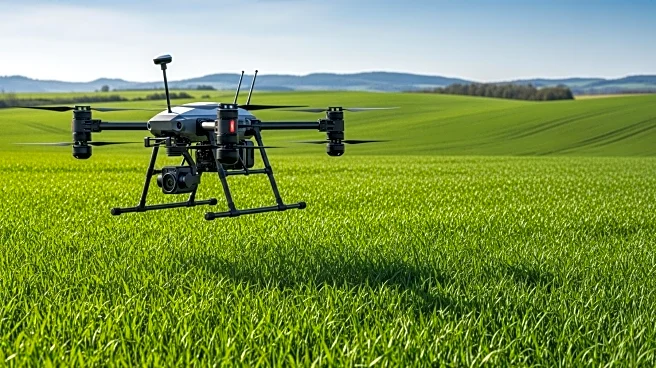What's Happening?
Artificial intelligence (AI) is increasingly being integrated into agricultural practices, providing tangible benefits to farmers in their daily operations. Heather Hampton Knodle, president of Knodle Farms in Illinois, highlighted the practical applications of AI in agriculture during the Rural Economic Outlook Conference at Oklahoma State University. AI is no longer a futuristic concept but a present reality, assisting farmers with tasks such as crop monitoring, soil analysis, and predictive analytics to optimize yields and resource management. This technological advancement is transforming traditional farming methods, making them more efficient and sustainable.
Why It's Important?
The integration of AI into agriculture is significant as it addresses several challenges faced by the industry, including labor shortages, resource management, and environmental sustainability. By automating routine tasks and providing data-driven insights, AI helps farmers increase productivity and reduce costs. This technological shift is crucial for the U.S. agricultural sector, which is a vital component of the national economy. As AI continues to evolve, it has the potential to revolutionize farming practices, ensuring food security and supporting the livelihoods of farmers across the country.
What's Next?
The continued adoption of AI in agriculture is expected to drive further innovation and efficiency in farming practices. Stakeholders, including technology developers, agricultural businesses, and policymakers, are likely to invest in research and development to enhance AI capabilities. Farmers may increasingly rely on AI tools for decision-making, leading to more sustainable and profitable agricultural operations. As AI technology becomes more accessible, it could also encourage smaller farms to adopt these advancements, leveling the playing field in the agricultural industry.
Beyond the Headlines
The ethical implications of AI in agriculture include concerns about data privacy and the potential displacement of traditional farming jobs. As AI systems collect and analyze vast amounts of data, ensuring the security and privacy of this information is paramount. Additionally, while AI can enhance efficiency, it may also lead to reduced demand for manual labor, impacting rural communities reliant on agricultural employment. Addressing these issues will be crucial as the industry navigates the integration of AI technologies.










